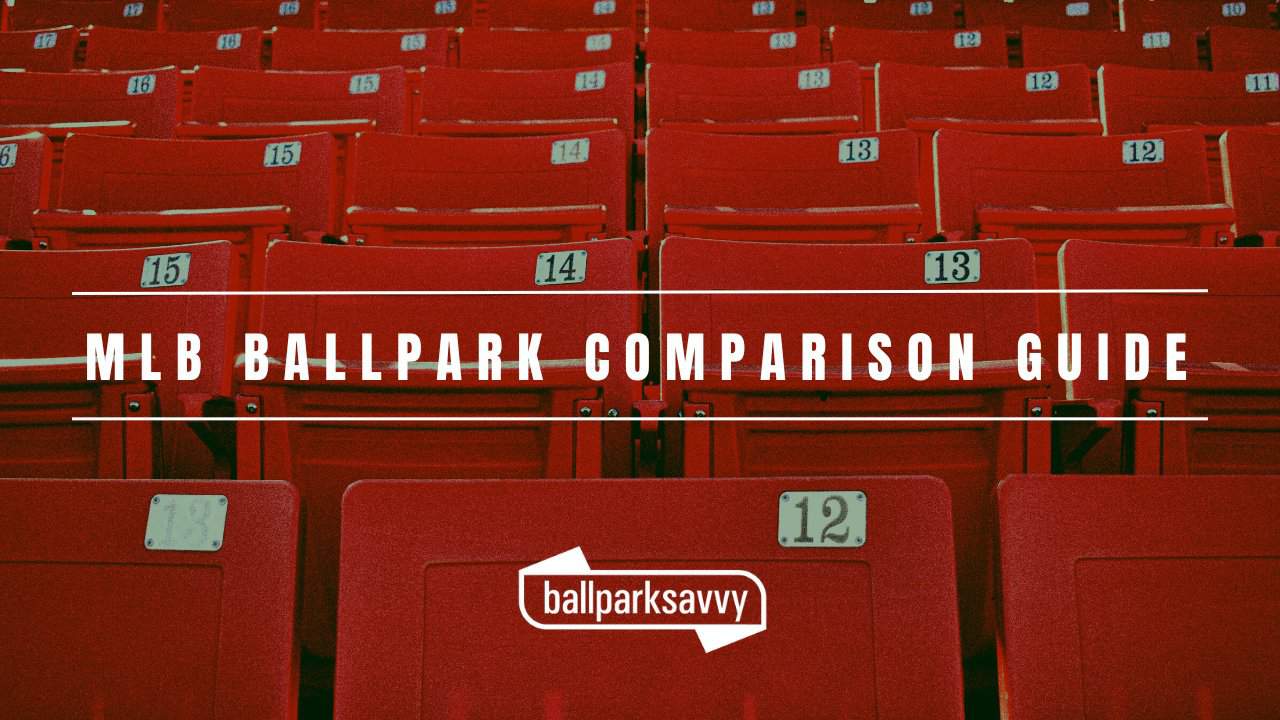Last Updated: March 3rd, 2023 by Jake Cain
Baseball fans love statistics! We know it’s always on the tip of your tongue to rattle off your home team’s record and your favorite players’ batting average and RBIs, and we’re willing to bet you can pull out some stats on the greats, too (most all-time home runs scored? Barry Bonds, 762. Best career batting average? Ty Cobb, .366. We could go on, and we bet you could too!).
Get ready, baseball fans, because we’re going to take a look at some stand-out stadiums in Major League Baseball by the numbers.
If you’ve ever found yourself wondering which stadium is the biggest, the smallest, the oldest, or the most expensive, we’ve got you covered!
| Ballpark | Original Name | Team | Opened | Capacity | Record Attendance | Cost | Turf | Dimensions |
|---|---|---|---|---|---|---|---|---|
| American Family Field | Miller Park | Milwaukee Brewers | 06/04/2001 | 41,900 | 46,218 | $40,000,000 | Kentucky Bluegrass | 342-L, 400-C, 337-R |
| Angel Stadium | Anaheim | Los Angeles Angels | 19/04/1966 | 45,517 | 64,406 | $24,000,000 | Tifway 419 Bermuda Grass | 347-L, 396-C, 350-R |
| Busch Stadium | Busch Stadium | St. Louis Cardinals | 04/04/2006 | 45,494 | 48,581 | $365,000,000 | Kentucky Bluegrass | 336-L, 400-C, 335-R |
| Camden Yards | Camden Yards | Baltimore Orioles | 06/04/1992 | 44,970 | 49,828 | $110,000,000 | Kentucky Bluegrass | 333-L, 400-C, 318-R |
| Chase Field | Bank One Ballpark | Arizona Diamondbacks | 31/03/1998 | 48,405 | 50,180 | $354,000,000 | Shaw Sports B1K | 330-L, 407-C, 334-R |
| Citi Field | Citi Field | New York Mets | 29/03/2009 | 41,922 | 45,186 | $900,000,000 | Kentucky Bluegrass | 335-L, 408-C, 330-R |
| Citizens Bank Park | Citizens Bank Park | Philadelphia Phillies | 03/04/2004 | 42,792 | 46,967 | $458,000,000 | Kentucky Bluegrass | 329-L, 401-C, 330-R |
| Comerica Park | Comerica Park | Detroit Tigers | 11/04/2000 | 41,083 | 45,280 | $300,000,000 | Kentucky Bluegrass | 342-L, 412-C, 330-R |
| Coors Field | Coors Field | Colorado Rockies | 26/04/1995 | 46,897 | 51,267 | $300,000,000 | Kentucky Bluegrass | 347-L, 415-C, 350-R |
| Dodger Stadium | Dodger Stadium | Los Angeles Dodgers | 10/04/1962 | 56,000 | 57,099 | $23,000,000 | Santa Ana Bermuda grass | 330-L, 395-C, 330-R |
| Fenway Park | Fenway Park | Boston Red Sox | 20/04/1912 | 37,305 | 47,627 | $650,000 | Kentucky Bluegrass | 310-L; 389-C, 302-R |
| Globe Life Field | Globe Life Field | Texas Rangers | 29/05/2020 | 40,300 | 43,598 | $1,100,000,000 | Shaw Sports B1K | 329-L, 407-C, 326-R |
| Great American Ball Park | Great American Ball Park | Cincinnati Reds | 31/03/2003 | 43,500 | 44,599 | $290,000,000 | Perennial Ryegrass | 328-L, 404-C, 325-R |
| Guaranteed Rate Field | Comiskey Park | Chicago White Sox | 18/04/1991 | 40,615 | 47,754 | $137,000,000 | Kentucky Bluegrass | 330-L, 400-C, 335-R |
| Kauffman Stadium | Royals Stadium | Kansas City Royals | 10/04/1973 | 37,903 | 42,633 | $70,000,000 | Kentucky Bluegrass | 387-L, 410-C, 387-R |
| loanDepot Park | Marlins Park | Miami Marlins | 05/03/2012 | 36,742 | 37,446 | $634,000,000 | Shaw Sports B1K | 344-L, 400-C, 335-R |
| Minute Maid Park | The Ballpark at Union Station | Houston Astros | 30/03/2000 | 41,168 | 44,203 | $250,000,000 | Platinum TE Paspalum | 315-L, 409-C, 326-R |
| Nationals Park | Nationals Park | Washington Nationals | 22/03/2008 | 41,339 | 45,966 | $693,000,000 | Kentucky Bluegrass | 337-L, 402-C, 335-R |
| Oracle Park | Pacific Bell Park | San Francisco Giants | 11/04/2000 | 41,915 | 44,046 | $357,000,000 | Tifway 419 Bermuda Grass | 399-L, 391-C, 365-R |
| Petco Park | Petco Park | San Diego Padres | 08/04/2004 | 40,209 | 79,123 | $450,000,000 | BullsEye Bermuda | 357-L, 396-C, 382-R |
| PNC Park | PNC Park | Pittsburgh Pirates | 31/03/2001 | 38,747 | 40,889 | $216,000,000 | Kentucky Bluegrass | 325-L, 399-C, 320-R |
| Progressive Field | Jacobs Field | Cleveland Guardians | 02/04/1994 | 34,830 | 45,274 | $175,000,000 | Kentucky Bluegrass | 325-L, 400-C, 325-R |
| RingCentral Coliseum | Oakland–Alameda County Coliseum | Oakland Athletics | 18/09/1966 | 56,782 | 56,310 | $25,500,000 | Tifway II Bermuda Grass | 330-L, 400-C, 300-R |
| Rogers Centre | SkyDome | Toronto Blue Jays | 03/06/1989 | 49,282 | 68,237 | $570,000,000 | AstroTurf 3D Xtreme | 328-L, 400-C, 328-R |
| T-Mobile Park | Safeco Field | Seattle Mariners | 15/07/1999 | 47,929 | 54,097 | $517,000,000 | Kentucky Bluegrass | 331-L, 401-C, 326-R |
| Target Field | Target Field | Minnesota Twins | 12/04/2010 | 38,544 | 44,152 | $555,000,000 | Kentucky Bluegrass | 339-L, 404-C, 328-R |
| Tropicana Field | Florida Suncoast Dome | Tampa Bay Rays | 03/03/1990 | 42,735 | 28,183 | $130,000,000 | Shaw Sports Turf | 315-L, 404-C, 322-R |
| Truist Park | SunTrust Park | Atlanta Braves | 31/03/2017 | 41,084 | 43,619 | $622,000,000 | Seashore Paspalum | 335-L, 400-C, 325-R |
| Wrigley Field | Weeghman Park | Chicago Cubs | 23/04/1914 | 41,649 | 47,171 | $250,000 | Merion Bluegrass | 335-L, 400-C, 353-R |
| Yankee Stadium | Yankee Stadium | New York Yankees | 02/04/2009 | 46,537 | 50,960 | $2,300,000,000 | Kentucky Bluegrass | 318-L, 408-C, 314-R |
What’s The Biggest Baseball Stadium?
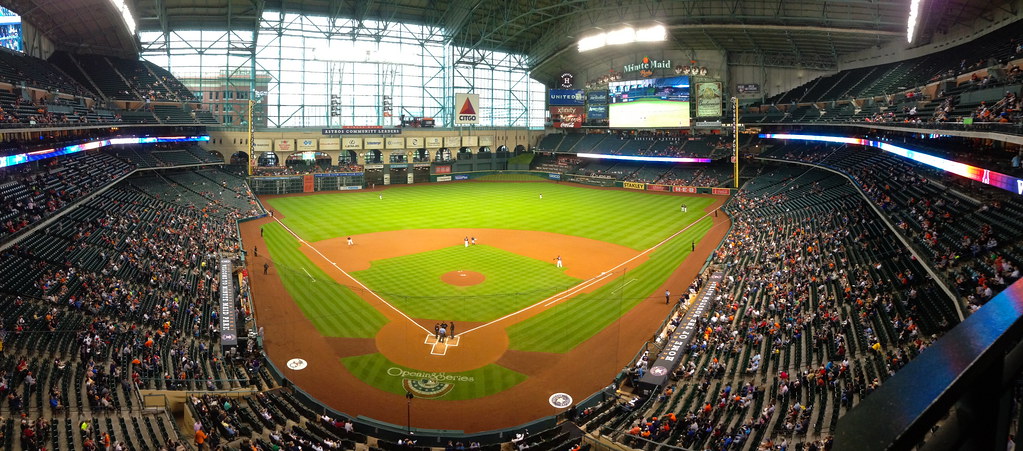
The deepest center field in Major League Baseball is located at Minute Maid Park, home of the Houston Astros. At 435 feet, it’s 15 feet deeper than any other outfield in the league, and 30 feet deeper than the average.
The left and right field distances, however, are rather short. This leads to plenty of high-scoring baseball games at this park.
Coors Field, home of the Colorado Rockies, has one of the largest outfields in the MLB, with dimensions 347-L, 415-C, and 350-R. This design is intended to combat the high elevation and arid climate of Denver, which both contribute to batted balls traveling farther in this extremely hitter-friendly stadium.
Balls used at Coors Field are also stored in a humidor to give both teams’ pitchers a better chance against hitters at this park.
Comerica Field, home of the Detroit Tigers, is also known for its deep center field distance. However, for the 2023 season, the center field wall will be moved in and lowered.
What’s The Smallest Baseball Stadium?


At 396 feet, Petco Park and Angel Stadium are tied for the shortest center field in the Majors. However, both have left and right field distances that hover around average.
Measured straight back, Fenway Park has a center field distance of 389 feet, the shortest in the Major Leagues.

The conventionally-given center field distance for this field, though, is the distance to the back of “The Triangle,” a portion of center field where the walls form a triangle whose furthest point is 420 feet from home plate.
This is just one of the quirks that make the oldest park in the MLB so unforgettable and irreplaceable.
There are a few stadiums with shorter-than-average left, center, and right field distances. Among them are Tropicana Field, Yankee Stadium, PNC Park, and Progressive Field.
Average MLB Field Dimensions
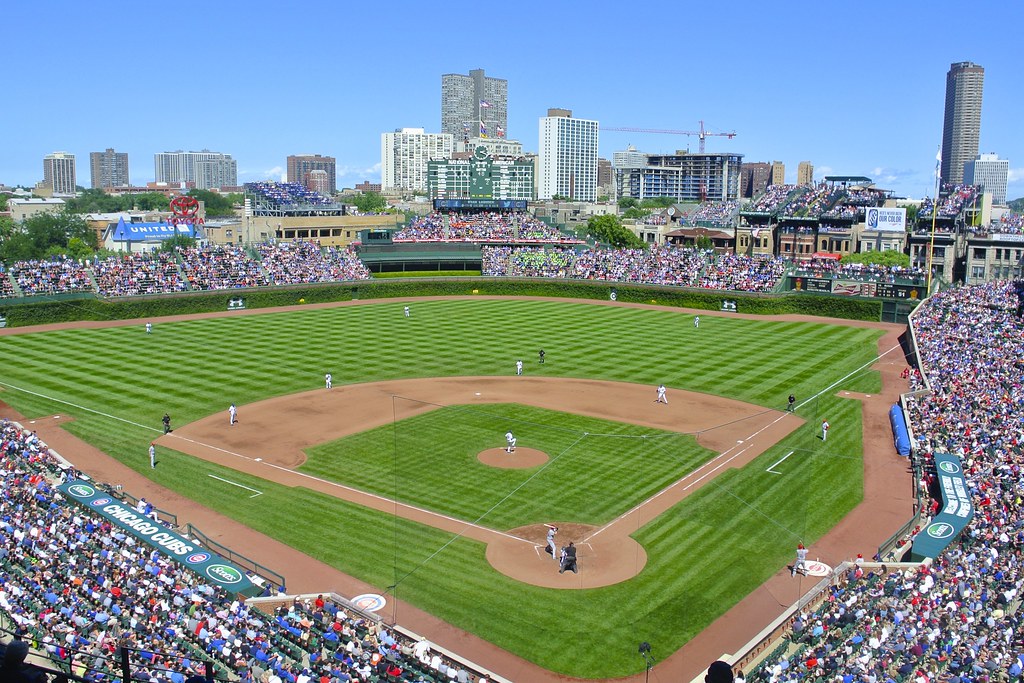
Baseball fans are well aware that not every field has the same dimensions. That’s unusual in the world of professional sports, where every aspect of the field is often closely regulated.
Across Major League Baseball’s 30 stadiums, the average left field distance is 331.5 feet, the average center field distance is 405 feet, and the average right field distance is 327 feet. Of course, while some fields’ numbers hover around the average, others make a greater departure.
Take, for example, Wrigley Field, with its longer-than-average left and right field distances and shorter-than-average center field distance, or Fenway Park, which has the opposite design – a longer-than-average deep right-center field distance (taking into account ‘The Triangle”) and shorter-than-average left and right field distances.

These quirks were common in “jewel box parks,” as these two historic fields were labeled because they were often shoehorned into already-busy residential and commercial areas.
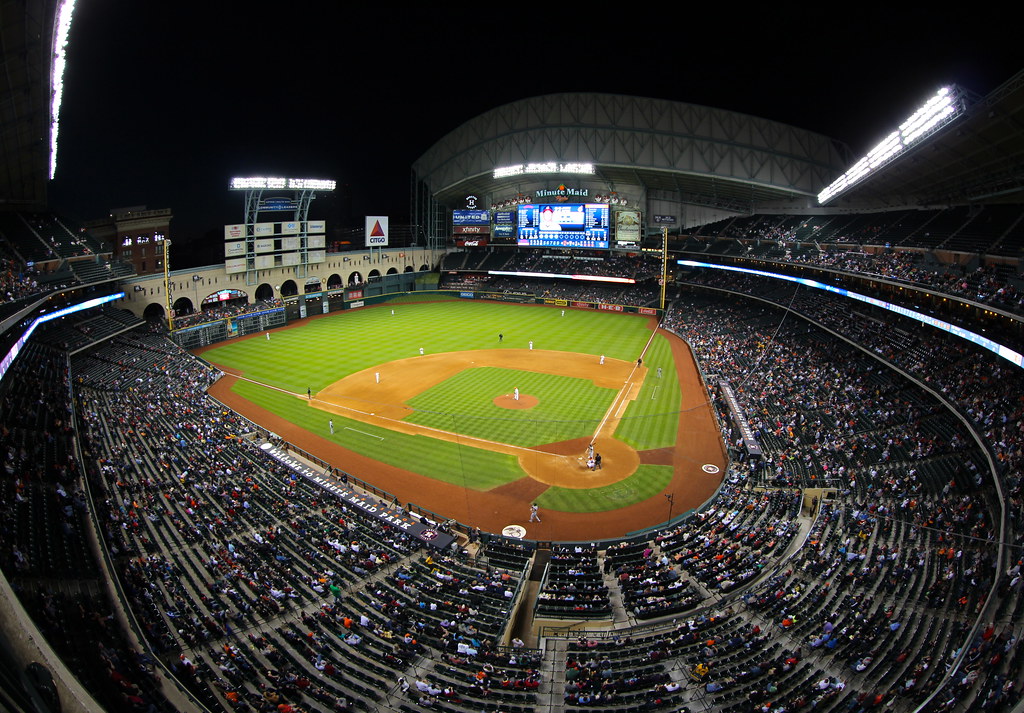
These variances can be found everywhere, though, even in modern stadiums. Minute Maid Park, for example, has a center field distance of a full 435 feet, while Angel Stadium is only 396 feet. That’s over a 13-yard difference!

Fans, players, and commentators are sure to have an opinion on whether or not the differing dimensions from park to park pose an advantage or disadvantage for different teams.
As for us, we just love the way it makes every stadium experience unique.
Largest Baseball Stadium by Capacity

If you love the roar of the crowd just as much as you enjoy hearing the crack of the bat, you might be wondering which MLB stadium has the greatest capacity.
That title belongs to Dodger Stadium, home of the Los Angeles Dodgers.
Dodger Stadium boasts a capacity of 56,000 and a record attendance of 57,099, set at the 2009 Dodger Home Opener.
RingCentral Coliseum (formerly Oakland Coliseum), home of the Oakland Athletics, can have a capacity of 56,782 without tarps. However, this is only done for specific games, such as the 2019 American League Wild Card Game against the Tampa Bay Rays.
Dodger Stadium, therefore, gets to keep its status as the biggest stadium by capacity under normal circumstances. Lucky thing, too – the average attendance at Dodgers games in 2022 was 47,671!
The A’s trailed far behind with an average attendance of 9,973. We don’t think those tarps will be going anywhere any time soon.
Smallest Baseball Stadium by Capacity

It’s true, bigger isn’t always better. If you prefer a smaller setting, you may be wondering which MLB Stadium is the smallest by capacity.
That dubious honor belongs to Tropicana Field, home of the Tampa Bay Rays. When the uppermost, obstructed-view seats are covered by tarps (and they are for most games), the capacity of this field is 25,025 fans.
Because Tropicana Field is one of the least-attended stadiums in the Major Leagues, closing the upper decks was an effort to improve the atmosphere at the stadium and provide a better fan experience.
Oldest MLB Field
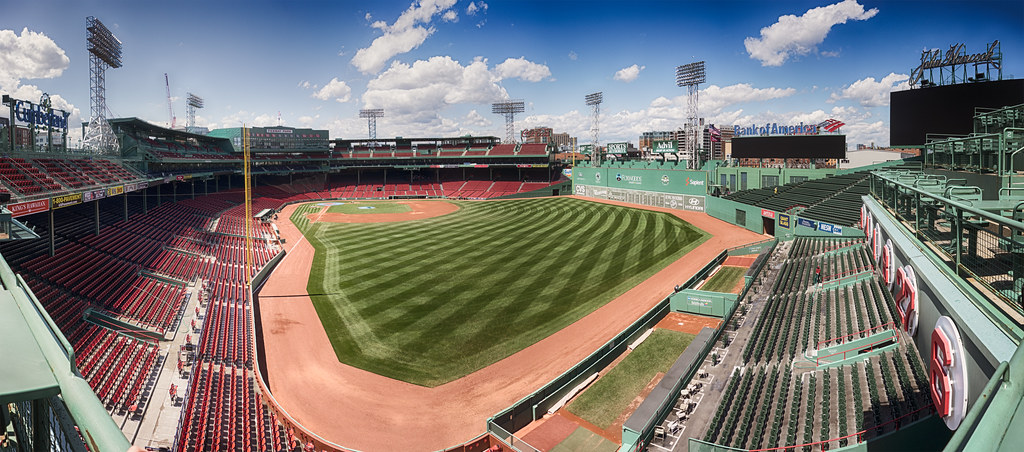
With over a century of baseball memories infused in its grassy turf, Fenway Park, home of the Boston Red Sox, is the oldest stadium in Major League Baseball.
This iconic jewel box ballpark was built in 1912. It has been on the National Register of Historic Places since its centennial year in 2012 and is a pending Boston Landmark.
While it has undergone significant renovations over the years, Fenway Park is one of the best-known and most iconic stadiums in professional sports and retains many of its original quirks and unique qualities.
Newest MLB Field

We all hold the historic MLB fields close to our hearts, but there’s something to be said about a shiny new ballpark with the most modern amenities, too!
Globe Life Field, the home of the Texas Rangers, has the honor of being the newest stadium in Major League Baseball at the time of writing.
Globe Life Field opened in 2020, hosting its first regular-season game on July 24, 2020. In the same year, the National League Championship Series and the World Series were played exclusively at Globe Life Field, an unusual move that was made necessary by the COVID-19 pandemic.
Frequently Asked Questions
Which MLB Stadium Cost the Most to Build?
Yankee Stadium, built in 2009, cost a whopping $1.6 billion. At the time of writing, it was the most expensive baseball stadium in Major League Baseball.
Globe Life Field in Arlington, Texas, comes in second place with a build cost of $1.2 billion.
Which MLB Stadium Cost the Least to Build?
The iconic Wrigley Field cost just $250,000 to build, but keep in mind that the home of the Chicago Cubs is also one of the oldest stadiums in the MLB!
The buying power of $250,000 in 1914 is closer to $8,000,000 in today’s dollars.
Are All Baseball Stadiums the Same Size?
There are some dimensions, like the distance from the pitcher’s mound and the distance between bases, that must be the same in every Major League Baseball stadium.
However no two MLB fields are exactly the same in size or shape, and many quirks and differences exist from park to park.
How Many Major League Stadiums Have a Natural Grass Surface?
Of the 30 Major League stadiums, 25 have natural grass surfaces.
Chase Field (Arizona Diamondbacks), loanDepot Park (Miami Marlins), Globe Life Field (Texas Rangers), Rogers Centre (Toronto Bluejays), and Tropicana Field (Tampa Bay Rays) are the only five to sport a synthetic surface.
How Many Major League Stadiums Have a Retractable Roof?
There are seven retractable roof stadiums in the Major Leagues. They are:
- American Family Field (Milwaukee Brewers)
- Chase Field (Arizona Diamondbacks)
- Globe Life Field (Texas Rangers)
- loanDepot Park (Miami Marlins)
- Minute Maid Park (Houston Astros)
- Rogers Centre (Toronto Blue Jays)
- T-Mobile Park (Seattle Mariners)

